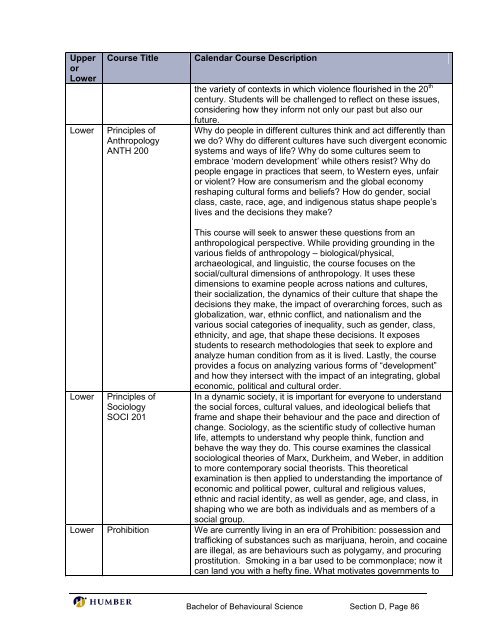Bachelor of Behavioural Science - Postsecondary Education Quality ...
Bachelor of Behavioural Science - Postsecondary Education Quality ...
Bachelor of Behavioural Science - Postsecondary Education Quality ...
You also want an ePaper? Increase the reach of your titles
YUMPU automatically turns print PDFs into web optimized ePapers that Google loves.
Upper<br />
or<br />
Lower<br />
Lower<br />
Course Title<br />
Principles <strong>of</strong><br />
Anthropology<br />
ANTH 200<br />
Calendar Course Description<br />
the variety <strong>of</strong> contexts in which violence flourished in the 20 th<br />
century. Students will be challenged to reflect on these issues,<br />
considering how they inform not only our past but also our<br />
future.<br />
Why do people in different cultures think and act differently than<br />
we do Why do different cultures have such divergent economic<br />
systems and ways <strong>of</strong> life Why do some cultures seem to<br />
embrace ‗modern development‘ while others resist Why do<br />
people engage in practices that seem, to Western eyes, unfair<br />
or violent How are consumerism and the global economy<br />
reshaping cultural forms and beliefs How do gender, social<br />
class, caste, race, age, and indigenous status shape people‘s<br />
lives and the decisions they make<br />
Lower<br />
Principles <strong>of</strong><br />
Sociology<br />
SOCI 201<br />
This course will seek to answer these questions from an<br />
anthropological perspective. While providing grounding in the<br />
various fields <strong>of</strong> anthropology – biological/physical,<br />
archaeological, and linguistic, the course focuses on the<br />
social/cultural dimensions <strong>of</strong> anthropology. It uses these<br />
dimensions to examine people across nations and cultures,<br />
their socialization, the dynamics <strong>of</strong> their culture that shape the<br />
decisions they make, the impact <strong>of</strong> overarching forces, such as<br />
globalization, war, ethnic conflict, and nationalism and the<br />
various social categories <strong>of</strong> inequality, such as gender, class,<br />
ethnicity, and age, that shape these decisions. It exposes<br />
students to research methodologies that seek to explore and<br />
analyze human condition from as it is lived. Lastly, the course<br />
provides a focus on analyzing various forms <strong>of</strong> ―development‖<br />
and how they intersect with the impact <strong>of</strong> an integrating, global<br />
economic, political and cultural order.<br />
In a dynamic society, it is important for everyone to understand<br />
the social forces, cultural values, and ideological beliefs that<br />
frame and shape their behaviour and the pace and direction <strong>of</strong><br />
change. Sociology, as the scientific study <strong>of</strong> collective human<br />
life, attempts to understand why people think, function and<br />
behave the way they do. This course examines the classical<br />
sociological theories <strong>of</strong> Marx, Durkheim, and Weber, in addition<br />
to more contemporary social theorists. This theoretical<br />
examination is then applied to understanding the importance <strong>of</strong><br />
economic and political power, cultural and religious values,<br />
ethnic and racial identity, as well as gender, age, and class, in<br />
shaping who we are both as individuals and as members <strong>of</strong> a<br />
social group.<br />
Lower Prohibition We are currently living in an era <strong>of</strong> Prohibition: possession and<br />
trafficking <strong>of</strong> substances such as marijuana, heroin, and cocaine<br />
are illegal, as are behaviours such as polygamy, and procuring<br />
prostitution. Smoking in a bar used to be commonplace; now it<br />
can land you with a hefty fine. What motivates governments to<br />
<strong>Bachelor</strong> <strong>of</strong> <strong>Behavioural</strong> <strong>Science</strong> Section D, Page 86
















